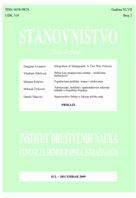Stanovništvo Srbije u fokusu tržišta rada
Citizens of Serbia in Focus of the Labour Market
Author(s): Danilo ŠukovićSubject(s): National Economy, Labor relations, Demography and human biology, Economic development, Migration Studies, Human Resources in Economy
Published by: Институт друштвених наука
Keywords: population; labour market; unemployment; reform;
Summary/Abstract: This paper analyzes the mutual dependence of the labor market and the population, since the supply of the labor force depends on population size and its structure. The demographic aspects of the labor market are especially analyzed and it is shown that the supply of the labor force does not depend only on the quantitative and qualitative characteristics of the population but that the mutual dependence of the labor market and demographic factors are much more complex and multiply expressive. An analysis of the key trends on the labor market presented in this paper indicates that the global economy requires an increasingly flexible labor force. In that sense, the forecasts of numerous economists and sociologists are based on the conviction that more and more people in future will become workers with a portfolio. They will posses a certain number of skills and qualifications which they will use to transfer from one job on to another during their working life. A continuous profession, namely a steady career, in today’s sense of the word, will only a relatively small number of people have. It all goes in favor of the theory that having a "job for your whole working life" is becoming a thing of the past. In this paper it is further concluded that for tracing the path for an efficient labor market, it should be considered that, during the nineties of the last century, there has been an increase in poverty and a change in population structure, not only because of a large inflow of refugees and internally displaced persons, but due to emigration of the younger population and an increase of the old, ill and dependent persons. All these changes greatly influenced the supply of the labor force, in a quantitative and qualitative way, and thus the strategy for increasing employment should be adjusted. The rapid expansion of the underground-informal economy must be added to all this, which grew rapidly in the nineties of the last century, naturally to the detriment of the formal sector. This paper especially stresses that the economic crisis has large unfavorable consequences on our labor market. The estimation of numerous experts indicate that after the economic recovery and end of the economic crisis, unemployment will still be very high and that the recovery of the labor market will be the slowest, namely that the effects of the economic recovery will reflect the slowest on the labor market, namely employment increase. For this reason it will be necessary to stimulate the reformative processes of the labor market so as to increase its efficiency and thus create conditions to rationally engage the large working potential of Serbia’s population, which is one of the key prerequisites for larger economic growth and development.
Journal: Stanovništvo
- Issue Year: 47/2009
- Issue No: 2
- Page Range: 85-99
- Page Count: 15
- Language: Serbian

